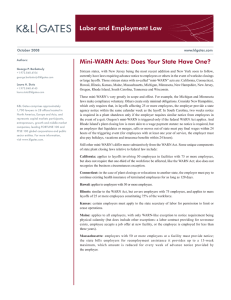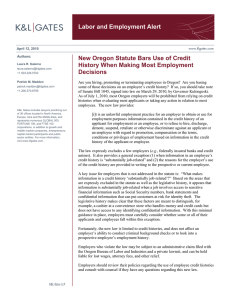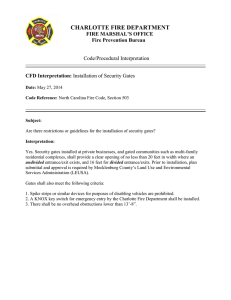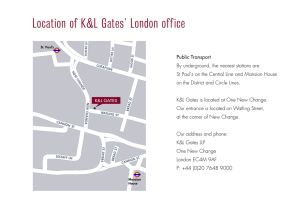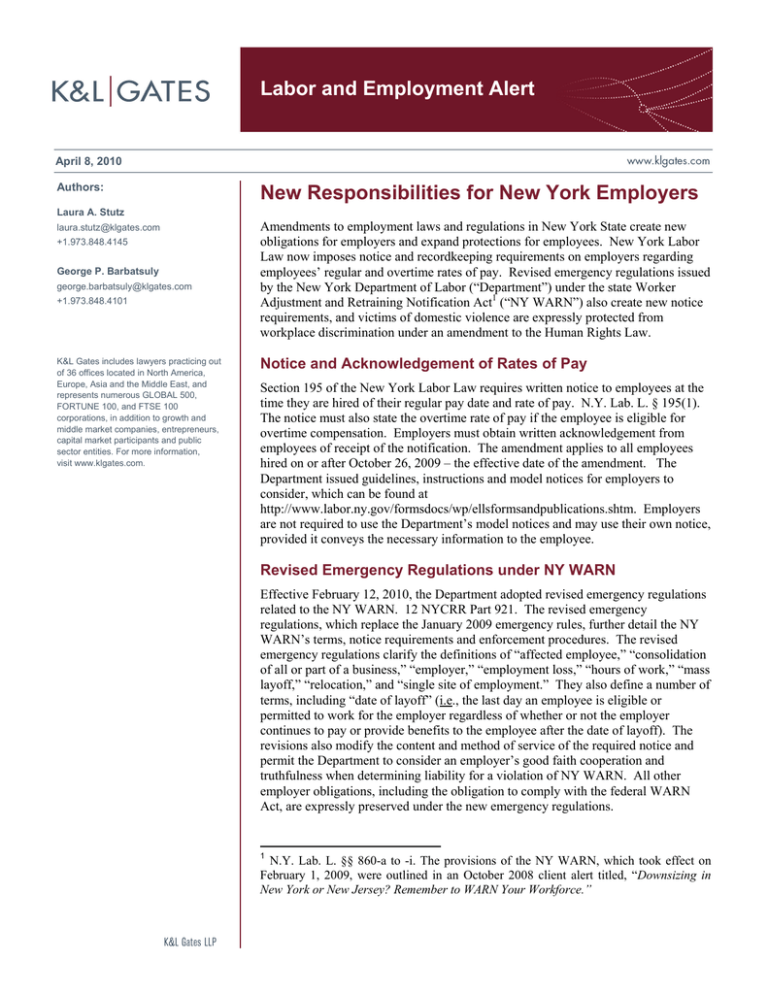
Labor and Employment Alert
April 8, 2010
Authors:
New Responsibilities for New York Employers
Laura A. Stutz
laura.stutz@klgates.com
+1.973.848.4145
George P. Barbatsuly
george.barbatsuly@klgates.com
+1.973.848.4101
K&L Gates includes lawyers practicing out
of 36 offices located in North America,
Europe, Asia and the Middle East, and
represents numerous GLOBAL 500,
FORTUNE 100, and FTSE 100
corporations, in addition to growth and
middle market companies, entrepreneurs,
capital market participants and public
sector entities. For more information,
visit www.klgates.com.
Amendments to employment laws and regulations in New York State create new
obligations for employers and expand protections for employees. New York Labor
Law now imposes notice and recordkeeping requirements on employers regarding
employees’ regular and overtime rates of pay. Revised emergency regulations issued
by the New York Department of Labor (“Department”) under the state Worker
Adjustment and Retraining Notification Act1 (“NY WARN”) also create new notice
requirements, and victims of domestic violence are expressly protected from
workplace discrimination under an amendment to the Human Rights Law.
Notice and Acknowledgement of Rates of Pay
Section 195 of the New York Labor Law requires written notice to employees at the
time they are hired of their regular pay date and rate of pay. N.Y. Lab. L. § 195(1).
The notice must also state the overtime rate of pay if the employee is eligible for
overtime compensation. Employers must obtain written acknowledgement from
employees of receipt of the notification. The amendment applies to all employees
hired on or after October 26, 2009 – the effective date of the amendment. The
Department issued guidelines, instructions and model notices for employers to
consider, which can be found at
http://www.labor.ny.gov/formsdocs/wp/ellsformsandpublications.shtm. Employers
are not required to use the Department’s model notices and may use their own notice,
provided it conveys the necessary information to the employee.
Revised Emergency Regulations under NY WARN
Effective February 12, 2010, the Department adopted revised emergency regulations
related to the NY WARN. 12 NYCRR Part 921. The revised emergency
regulations, which replace the January 2009 emergency rules, further detail the NY
WARN’s terms, notice requirements and enforcement procedures. The revised
emergency regulations clarify the definitions of “affected employee,” “consolidation
of all or part of a business,” “employer,” “employment loss,” “hours of work,” “mass
layoff,” “relocation,” and “single site of employment.” They also define a number of
terms, including “date of layoff” (i.e., the last day an employee is eligible or
permitted to work for the employer regardless of whether or not the employer
continues to pay or provide benefits to the employee after the date of layoff). The
revisions also modify the content and method of service of the required notice and
permit the Department to consider an employer’s good faith cooperation and
truthfulness when determining liability for a violation of NY WARN. All other
employer obligations, including the obligation to comply with the federal WARN
Act, are expressly preserved under the new emergency regulations.
1
N.Y. Lab. L. §§ 860-a to -i. The provisions of the NY WARN, which took effect on
February 1, 2009, were outlined in an October 2008 client alert titled, “Downsizing in
New York or New Jersey? Remember to WARN Your Workforce.”
Labor and Employment Alert
Protected Status of Domestic Violence
Victims
Effective July 7, 2009, the New York Human Rights
Law was amended to provide protection from
employment discrimination for victims of domestic
violence. N.Y. Exec. Law § 296.1(a). Employers
are prohibited from considering an individual’s
status as a victim of domestic violence when making
employment decisions such as hiring, advancement,
compensation or other terms of employment. A
“domestic violence victim” is defined as an
individual “who is a victim of an act which would
constitute a family offense” under section 812 of the
New York Family Court Act. N.Y. Exec. Law §
292(34). “Family offense” covers a multitude of
crimes, including disorderly conduct, harassment,
stalking and assault. N.Y. Fam. Ct. Act § 812(1).
Employers who are found guilty of discriminating
against an employee based on a protected status
subject themselves to substantial liability and
penalties.
Conclusion
New York employers should evaluate their new hire
documentation, anti-discrimination policies and, if
considering downsizing, the terms, notice
requirements and enforcement procedures of the NY
WARN Act to ensure compliance with the recent
legislative and administrative amendments and
reduce the risk of claims by employees.
Anchorage Austin Beijing Berlin Boston Charlotte Chicago Dallas Dubai Fort Worth Frankfurt Harrisburg Hong Kong London
Los Angeles Miami Moscow Newark New York Orange County Palo Alto Paris Pittsburgh Portland Raleigh Research Triangle Park
San Diego San Francisco Seattle Shanghai Singapore Spokane/Coeur d’Alene Taipei Tokyo Warsaw
Washington, D.C.
K&L Gates includes lawyers practicing out of 36 offices located in North America, Europe, Asia and the Middle East, and represents numerous
GLOBAL 500, FORTUNE 100, and FTSE 100 corporations, in addition to growth and middle market companies, entrepreneurs, capital market
participants and public sector entities. For more information, visit www.klgates.com.
K&L Gates is comprised of multiple affiliated entities: a limited liability partnership with the full name K&L Gates LLP qualified in Delaware and
maintaining offices throughout the United States, in Berlin and Frankfurt, Germany, in Beijing (K&L Gates LLP Beijing Representative Office), in
Dubai, U.A.E., in Shanghai (K&L Gates LLP Shanghai Representative Office), in Tokyo, and in Singapore; a limited liability partnership (also named
K&L Gates LLP) incorporated in England and maintaining offices in London and Paris; a Taiwan general partnership (K&L Gates) maintaining an
office in Taipei; a Hong Kong general partnership (K&L Gates, Solicitors) maintaining an office in Hong Kong; a Polish limited partnership (K&L
Gates Jamka sp. k.) maintaining an office in Warsaw; and a Delaware limited liability company (K&L Gates Holdings, LLC) maintaining an office in
Moscow. K&L Gates maintains appropriate registrations in the jurisdictions in which its offices are located. A list of the partners or members in each
entity is available for inspection at any K&L Gates office.
This publication is for informational purposes and does not contain or convey legal advice. The information herein should not be used or relied upon
in regard to any particular facts or circumstances without first consulting a lawyer.
©2010 K&L Gates LLP. All Rights Reserved.
April 8, 2010
2


